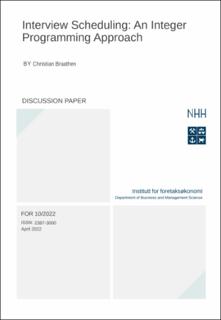| dc.description.abstract | This article provides a general meeting scheduling model to schedule en-masse interviews over multi-day events. Creating such meeting schedules is a complicated, time-consuming task that usually requires considerable manual planning when hundreds of meetings are involved and if the quality of the schedule is a priority. The problem consists of three overlapping and gradually more difficult objectives—that is, at favorable times, to assign meetings, assign individual interviewers consecutive meetings, and assign interviewer pairs consecutive meetings. The model has been applied five times within a student organization, ranging from 17 to 1149 meetings to be scheduled. Compared to former, manually created schedules, both the organization’s and the interviewers’ perceived interviewing experience is markedly improved. | en_US |
